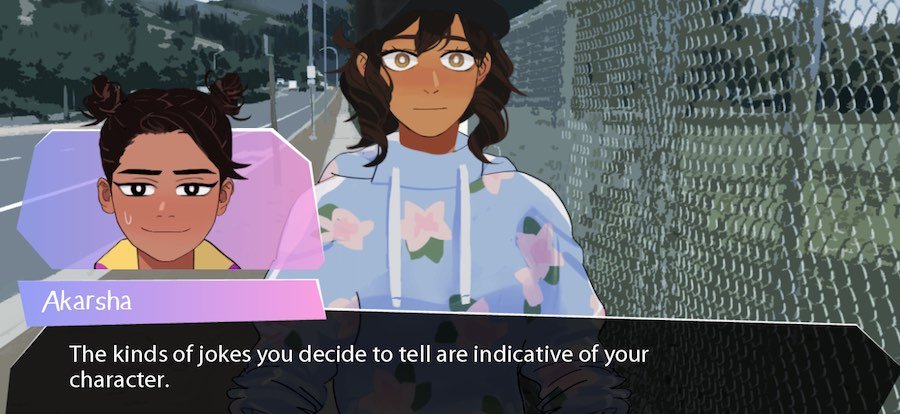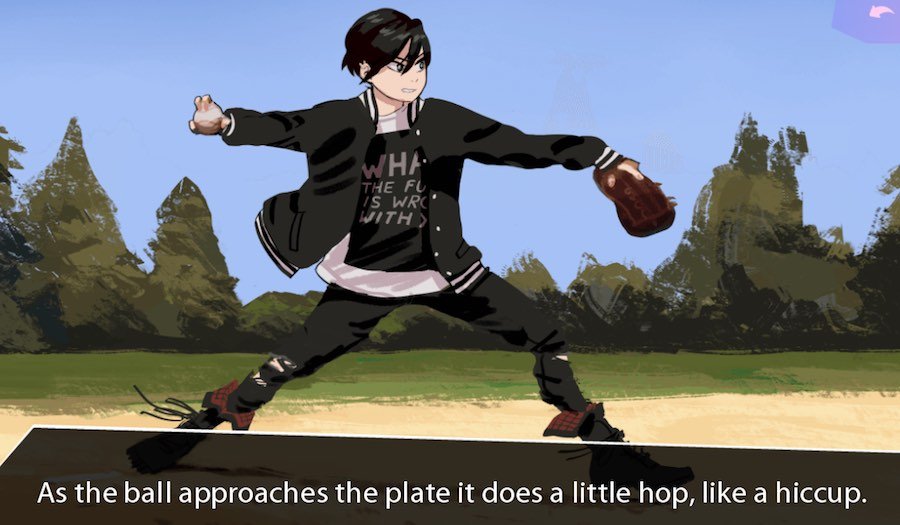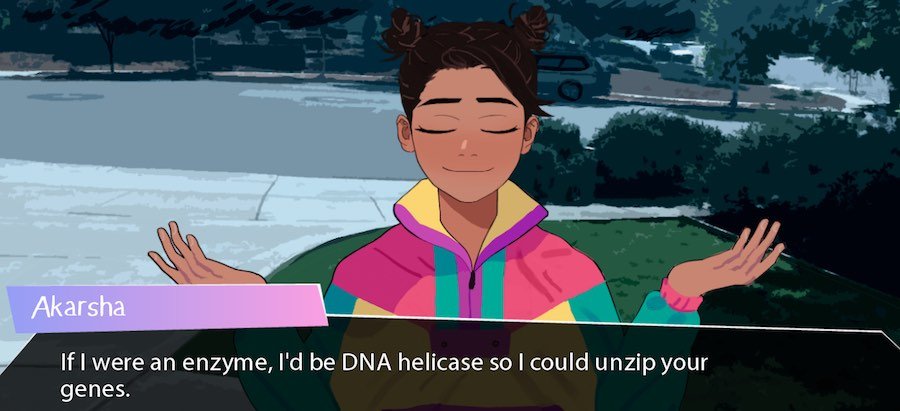
Before getting into Butterfly Soup - one of my favorite gaming and narrative experiences this year - I want to loosely define a few phrases:
Slice-of-life Slice-of-life, as an idiom, is sort of quaintly useless. Life is broad, and the slices can be generous. Ironically, in gaming, we use the term “vertical slice” to delineate the most exciting parts of a video game.
YA Yesterday on the Chicago L I saw a 50-something-year-old woman with a giant Hunger Games mocking jay tattoo on her neck. She probably wasn’t Hunger Games author Suzanne Collins. I know that for industry/genre enthusiasts YA is a useful term, but it’s also a dumb one.
Visual novel Visual novels are popular in Japan, but not living in Japan I haven’t spent much time with them. I did play the grossly overwritten 999: Nine Hours, Nine Persons, Nine Doors. It didn’t exactly leave me wanting more.
In visual novels, the player/reader reads text (mostly dialogue), looks at character portraits and makes occasional choices. Some visual novels include slightly more gamified systems, like inventories or stats, but generally they’re even less dynamic than choose-your-own-adventure books.
Okay, now Butterfly Soup:
What is Butterfly Soup?
Butterfly Soup is a slice-of-life YA visual novel. As an interactive media, that’s the simplest descriptor. Butterfly Soup was designed by Brianna Lei and released via her itch.io for PC, Mac and Linux.
In Butterfly Soup you follow the trials and tribulations of a high school girls intramural baseball team as the players navigate adolescent life and love. The spin here is that your four main characters are all of Asian descent (India, Korea, Taiwan) and queer. Love is tough in Butterfly Soup, as is family, ambition, friendship and math — but the game isn’t dour. It has all the exuberance of adolescence, the fun, the newness of relationships and liberation.
Butterfly Soup is a video game for anyone tired of video games.
Butterfly Soup is a game for anyone who loves meme culture but wants to transcend meme culture.
And… Butterfly Soup is technically free, but you’d be a fool not to support this talent. Get it here.
There’s so much I want to say about this game, things that don’t fit neatly into a review. Butterfly Soup cheers me up, it makes me feel hopeful for games, for writing, for humanity. It’s done the work that only very good novels do and made me feel like I have new friends.
And while it doesn’t do anything revolutionary with the systems of a visual novel, everything about Butterfly Soup feels fresh.
There are four primary characters: Diya, Noelle, Akarsha and Min. The game starts you from Diya’s perspective, the summer between 3rd and 4th grade. Diya’s a jock-in-training, and shares an intense bond with her friend Min - although they’ve got nothing in common except an interest in baseball. Diya and Min have rhythm, a rapport. Diya’s family is from Madras (now Chennai) in India, Min’s from Korea. They teach each other non-English phrases. As the game puts it, theirs is the kind of friendship where Min won’t make Diya pay for landing on her properties in Monopoly - Diya can always stay rent free. But there’s a tension underneath. The tension turns out to be two-fold: Min’s family is about to move, and they’re a little in love with one another.
The power of that love is simply but beautifully illustrated in Min’s description of a knuckleball while the two are at an Oakland A’s game with Min’s family. She explains that the pitch is notoriously hard to master, notoriously hard for batters to hit, but also notoriously hard for catchers to catch. It moves “like a butterfly with hiccups,” and so the pitcher and catcher have to have a special relationship to use the pitch effectively. It’s a “baseball marriage” — the metaphor is laid on heavy, but its earnest.
In any case, Min leaves. We jump ahead to Freshman year of high school. Diya and her best friend Noelle stumble into an all-girls intramural baseball team. They, and their friend Akarsha, join. And then Min shows up, five years absent, and the hormones and meme jokes and messy, awkward particulars of adolescence just build from there.
Every moment of this game is a joy, and difficult to spoil, but you’ll rotate through the perspectives of each of the four main characters: Socially awkward jock Diya, the violent but devoted Min, academic and sly Noelle, and — my personal favorite — the comedic pinball Akarsha.
OK, but it’s a game right? Aesthetically, the game has a consistent if homespun design. Backgrounds are photos run through a painterly filter - like a nice, thick mix of acrylic and water color. The UI is clean, unobtrustive. Character portraits are where Lei’s art really shines. Though simple, each portrait (everyone has several variations) is gestural and expressive: Noelle’s folded arms and the set of her mouth, a thin white oval, which always makes her teeth look gritted. Or Diya’s perfect posture that somehow belies discomfort and social anxiety. Or my favorite: Akarsha’s shrug, which is both a trolling LOL and C’est la vie.
It’s all lovingly crafted, nothing feels cheap or recycled. Just look at the characters ears’, each of which has its own unique shape and swirl. Each also has her own textual sound, as dialogue appears on screen.
And it’s worth noting, the game does interesting things with perspective, subtly breaking visual novel norms.
For instance, when Min teaches Diya the Korean for “hello,” we don’t see a subtitled translation, because Diya doesn’t speak Korean, she’s just repeating phonetically what Min is teaching her. And Min being Min, and their relationship being what it is, we know there’s more going on here.
And although you “play as” Diya or Noelle or Akarsha or Min at various points in the game, you don’t literally view the environments through their eyes. The camera (static as images are) moves around more cinematically. In a genre well-known for it’s male gaze and invisible protagonists, it’s a wonderful and necessary touch.

Back to the writing, though Butterfly Soup is full of really good dialogue, but also fantastic character writing. Everyone feels young, which is why I’d call it YA - but this isn’t a knock. When Akarsha trips and calls it “parkour!” it’s a uniquely adolescent response, and better for it. Even occasional narrative text is clean, clever. Of Min’s pitching: “The ball comes in chest high, perfectly spinless. If someone had written a message on it, you could read it.”
Each of the four main characters could easily be broken down into a stereotype, which is exactly what high school is — figuring out which stereotype you are, and then transcending it. Min’s butterfly knives and Nelly bandage, her leather jacket. Akarsha’s inability to stop joking, to recognize danger. When these two meet for the first time the situation combusts exactly how you’d expect it to, but better. And they come out on the other side richer for it, more developed. Their characters play off one another better, leading to moments like when Akarsha, quizzing randomly, asks Min “Would you kiss a girl for 1 million dollars?” Min’s response: “I guess? I don’t have that kind of money, though.”
And on that note, I want to express how important this game is to me and yet how much this game isn’t necessarily for me:
As a cis straight white male, I will never actually know what it’s like to be a high school girl of asian descent, with any cultural mores or expectations that follow, much less a lesbian. (I also have like zero interest in baseball.) But a game like this makes it easy to empathize, too disappear into character. When the girls observe the conspicuously loud noise a pad makes when being unwrapped, I don’t literally relate, but I get it. I too have an adolescent, and I remember its quirks, the freshness and fear of a world opening up to you.
And when Akarsha says, “I tell gay jokes because I am a gay joke,” it breaks my heart.
Because, as an adolescent, I sure as fuck felt longing, sexual confusion, anxiety and love.
Obviously, Butterfly Soup doesn’t need to be accessible to me to be an incredible accomplishment. That a group triply-marginalized in gaming culture has its story told, and told so well, is a triumph. This is good writing. This is great writing.

On memes and sports
The game is internet trendy — think Undertale — but not reliant on that for its humor. There’s a lot of clever observations on race, too. As children, Min and her brother Jun assume everyone on TV is white because Asian parents would never let their kids become actors. “It’s too risky. Only white parents are that dumb.”
(Meme side note: if you love the “Jurassic Park theme on recorder” video even half as much as me, you’re in for a delight.)
Butterfly Soup is also a product of gaming culture — one common sound effect is ripped either from Metal Gear’s ubiquitous “!” or the SNES-era Final Fantasy start-of-random-encounter music. (These may just be the same sound.) An another of Akarsha’s non-sequiturs: “How many 2nd graders you think you could beat up if they came at you in waves of 10, with a 5th grade boss coming every 5 waves?”
You’ll also learn something about baseball, like why a K is used to indicate a strikeout. Or how a deke — a sort of a elaborate feint in baseball — works. You’ll learn almost nothing about softball, though. As Diya says it, “Softball is like baseball put through Google Translate and back. Everything’s off by a few degrees.”

What is Butterfly Soup not?
Butterfly Soup is not a dating sim, and thank Christ.
Butterfly Soup is not a tonally bankrupt blockbuster, with dialogue designed not to make you feel great but to make you feel “This is the dialogue I paid for and deserve.”
Butterfly Soup is not about character creation, or being able to make your space marine female.
Butterfly Soup is not about hitting things, as often as Min hits things and Akarsha hits on things.
Butterfly Soup is not for completist, but for the curious.
Butterfly Soup is maybe not for you, but it is for you to play. And you should play it.★